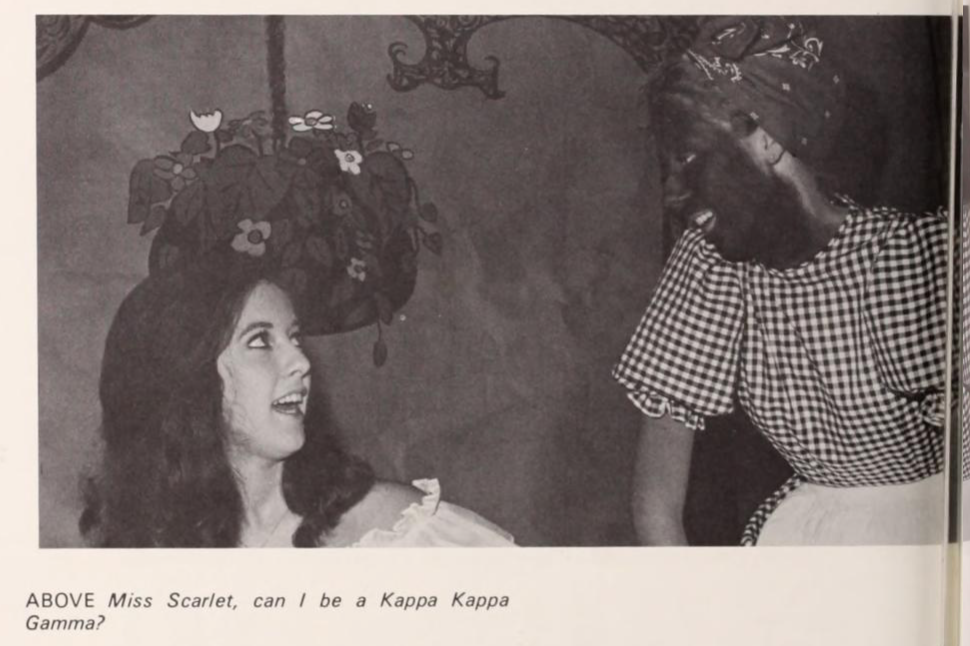A photo in the University of Mississippi’s 1970 yearbook shows a member of the Delta Psi fraternity dressed in a Ku Klux Klan robe and hood, holding two flaming torches.
“The leader of the ‘SECRET PSIs’ prepares to open their chapter meeting,” the photo caption on the Delta Psi yearbook page reads.
A photo in the 1979 Mississippi State University yearbook shows two shirtless members of Phi Gamma Delta fraternity with their faces, torsos and arms darkened.
In the 1969 Ole Miss yearbook, two photos show members of two sororities — Chi Omega and Kappa Kappa Gamma — performing skits in blackface. One caption makes a reference to “Gone With the Wind,” and apparently, the longstanding tradition of white sororities prohibiting black women from joining.
“Miss Scarlet (sic), can I be a Kappa Kappa Gamma?” the caption reads.
Mississippi Today reviewed publicly available yearbooks of several colleges and universities dating back to 1960. The analysis reveals decades of racism and other forms of insensitivity members of white Greek organizations proudly displayed at Mississippi colleges and universities, which are now preserved in digitized form.
Photos of Democratic Virginia Gov. Ralph Northam’s medical school yearbook page featuring images of a man in blackface and another in full Klan regalia touched off a political storm in that state. The scandal eventually sent a wave of reporters and political opposition researchers across the country digging through college yearbooks of their own officials.
Democratic Attorney General Jim Hood and Republican Lt. Gov. Tate Reeves — the leading candidates for their parties’ gubernatorial nominations — also came under fire Friday for their associations with fraternities that published objectionable photos on college yearbook pages.

American Bridge 21st Century, a Democratic Super PAC that performs political opposition research, posted on its website yearbook pages of the Millsaps College chapter of Kappa Alpha Order in the early 1990s, when current Lt. Gov. Tate Reeves was a member of the fraternity.
The photos include one of three members with their faces painted, one wearing dark-colored face paint and the stars-and-bars pattern of the Confederate battle flag. Another photo on the fraternity page features a group of men dressed as Confederate soldiers and planters, one of whom is waving a Confederate banner.
It is unclear whether Reeves is in any of those photos, but he can be seen clearly in another photo posing with an unidentified man as well as in a composite of fraternity chapter members.

When reporters asked Reeves’s office about the photos, his spokeswoman, Laura Hipp, responded with a statement: “As a quick Google search will show, Lt. Gov. Reeves was a member of Kappa Alpha Order. Like every other college student, he did attend costume formals and other parties, and across America, Kappa Alpha’s costume formal is traditionally called Old South in honor of the Civil War veteran who founded the fraternity in the 1800s.”
The formal is the most visible ritual in which the fraternity known as KA — its members, KAs — founded after the end of the Civil War, reveres the Confederacy.
The fraternity to which Hood belonged in the early 1980s, also published a photo in the Ole Miss yearbook showing several men with their faces painted in dark and light-colored paint wearing necklaces and holding sticks. Another man to right side of the photo is wearing what appears to be a white sheet with holes cut out for the eyes and mouth.
A spokeswoman for Hood said he was member of the fraternity, Pi Kappa Alpha, at the time the photo appeared in the yearbook but that Hood is not among the men in the photos.
James Thomas, a sociology professor at University of Mississippi, said the use of blackface is intimately tethered to rituals that reinforce the narrative of the Lost Cause.
“All of these instances coexisted with Dixie Week, Confederate balls, Robert E. Lee beard growing contests — all of these other reenactments of ‘Lost Cause’ tropes. Greek life was really instrumental in introducing those things. They were highly organized, tightly knit networks of wealthy whites,” Thomas said. “What better way to narrate their ideas of place and status than to use their social networks to put forward their ideas of African Americans’ lack of place on campus and in society?”
In the 1970 Ole Miss yearbook, the yearbook page for Sigma Nu — a fraternity in which U.S. Sen. Roger Wicker was a freshman that year — shows a student whose face, arms and hands are covered in a dark paint and who is wearing what appears to be a sombrero.
“Si, if only my name was Carlos,” the photo caption reads.
A photo in the Mississippi State’s 1984 yearbook shows a Phi Tau fraternity member with a darkened face wearing a coat and tie. A photo in Mississippi State’s 1986 yearbook shows a Sigma Phi Epsilon fraternity member posing with a darkened face and arm.
Photos in the University of Southern Mississippi’s 1986-87 yearbook shows the entire Kappa Alpha fraternity. Every member is posing for their composite headshot in a Confederate soldier uniform with a Rebel battle flag draped in the background.
More recently, blackface incidents at white Greek organizations in Mississippi have made national headlines.
A photo of a 2001 Halloween party showed a member of the Alpha Tau Omega fraternity at Ole Miss pointing a gun at the head of another who was dressed in blackface, kneeling and picking cotton. The university suspended the ATO chapter for a year.
In 2009, a Mississippi College student wore blackface to a Michael Jackson-themed tribe party. In response, college officials condemned the act but pointed out that some of the blackface makeup was applied by an African-American student.
In 2011, the Phi Mu sorority at the University of Southern Mississippi placed six members on probation for dressing for a party in blackface depicting the Huxtable family from the sitcom “The Cosby Show.”
“White Greek letter organizations are based on excluding some people and allowing the already privileged to use that privilege and network with each other for political opportunities and economic opportunities,” said Matthew Hughey, a sociology professor at University of Connecticut.
Hughey, who was previously a sociology professor at Mississippi State University, said blackface and other racist behavior among white Greek organizations perpetuate “white dominance on campus and in greater society.”
“As long as we have a group of citizens, African-Americans, that is subjected to a huge wealth gap, that still receives unbalanced, inferior services and is subjected to more surveillance and discrimination, you’re going to see (that) depictions of those people are caricatures or objects of ridicule,” Hughey said. “We shouldn’t be surprised when white Greek letter organizations, designed to be exclusionary and powerful, do exclusionary and powerful things.”


























